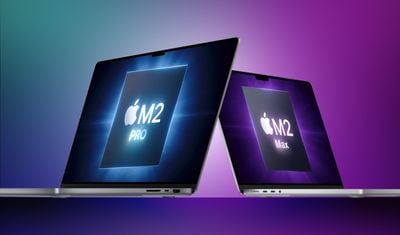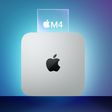Next-Generation MacBook Pros Rumored to Feature 'Very High-Bandwidth' RAM
Apple's next-generation 14-inch and 16-inch MacBook Pro models with M2 Pro and M2 Max chips will be equipped with "very high-bandwidth, high-speed RAM," according to information shared by MacRumors Forums member Amethyst, who accurately revealed details about the Mac Studio and Studio Display before those products were announced.

The current 14-inch and 16-inch MacBook Pro models are equipped with LPDDR5 RAM from Samsung, with the M1 Pro chip providing up to 200 GB/s of memory bandwidth and the M1 Max chip topping out at 400 GB/s. On a speculative basis, it is possible that the next MacBook Pro models could be equipped with Samsung's latest LPDDR5X RAM for up to 33% increased memory bandwidth with up to 20% less power consumption. This would result in up to 300 GB/s memory bandwidth for the M2 Pro and up to 600 GB/s for the M2 Max.
Bloomberg's Mark Gurman expects the next MacBook Pros to have few other changes beyond the M2 Pro and M2 Max chips. At this point, it seems likely that the laptops will be announced in November at the earliest with press releases on the Apple Newsroom site. Apple has launched new Macs in November multiple times in recent years, including the original 16-inch MacBook Pro in 2019 and the first three Macs with the M1 chip in 2020.
The current 14-inch and 16-inch MacBook Pro models with the M1 Pro and M1 Max chips were released in October 2021 and featured a complete redesign with a notch in the display and additional ports like HDMI, MagSafe, and an SD card reader.
Popular Stories
Game emulator apps have come and gone since Apple announced App Store support for them on April 5, but now popular game emulator Delta from developer Riley Testut is available for download. Testut is known as the developer behind GBA4iOS, an open-source emulator that was available for a brief time more than a decade ago. GBA4iOS led to Delta, an emulator that has been available outside of...
iOS 18 is expected to be the "biggest" update in the iPhone's history. Below, we recap rumored features and changes for the iPhone. iOS 18 is rumored to include new generative AI features for Siri and many apps, and Apple plans to add RCS support to the Messages app for an improved texting experience between iPhones and Android devices. The update is also expected to introduce a more...
The first approved Nintendo Entertainment System (NES) emulator for the iPhone and iPad was made available on the App Store today following Apple's rule change. The emulator is called Bimmy, and it was developed by Tom Salvo. On the App Store, Bimmy is described as a tool for testing and playing public domain/"homebrew" games created for the NES, but the app allows you to load ROMs for any...
Apple today said it removed Game Boy emulator iGBA from the App Store for violating the company's App Review Guidelines related to spam (section 4.3) and copyright (section 5.2), but it did not provide any specific details. iGBA was a copycat version of developer Riley Testut's open-source GBA4iOS app. The emulator rose to the top of the App Store charts following its release this weekend,...
Last September, Apple's iPhone 15 Pro models debuted with a new customizable Action button, offering faster access to a handful of functions, as well as the ability to assign Shortcuts. Apple is poised to include the feature on all upcoming iPhone 16 models, so we asked iPhone 15 Pro users what their experience has been with the additional button so far. The Action button replaces the switch ...
A week after Apple updated its App Review Guidelines to permit retro game console emulators, a Game Boy emulator for the iPhone called iGBA has appeared in the App Store worldwide. The emulator is already one of the top free apps on the App Store charts. It was not entirely clear if Apple would allow emulators to work with all and any games, but iGBA is able to load any Game Boy ROMs that...





















Top Rated Comments
Ran a simple benchmark on a new Ryzen 7950x desktop build (64GB RAM) here in the lab (the build will be returned to the supplier) vs my M1 Max laptop (64GB RAM).
Task: Take about 10000 parquet files (10.6GB total) and append them into 1 dataframe (> 400 million observations) in memory.
Hypothesis: The Ryzen 7950x should be way faster - at first thought - because it has 16 cores (versus 8 M1 Max performance cores) that are also clocked way higher.
Result: They are equally as fast because the Ryzen CPU is bottlenecked by memory bandwidth (very fast cores but just 2 memory channels on the CPU).
The files:
The task is most efficiently done in parallel using all cores available, used both polars (Rust ) and pandas-modin (C++) to do this as fast as possible.
When using all 8 performance cores on my M1 Max, memory bandwidth to CPU is at about 120 GB/s (theoretical max is 200Gb/s).
Yet the Ryzen 7950x can do 81 GB/s memory bandwidth at most as the memory runs at 5200MT/s (* 8 bytes * 2 memory channels)/1024 = 81.25 GB/s (you can stretch this to about 100 GB/s if you heavily overclock). Thus despite the 7950x's 16 faster cores it's as fast as my M1 Max with 10 cores in this task because about 6 Ryzen cores are enough to reach that 81GB/s of bandwidth. The other 10 cores are starved from input and just idling.
This is not new; others have ran similar tasks with similar results. E.g. https://tlkh.dev/benchmarking-the-apple-m1-max who finds that
"... adding more cores on the 5600X does not help (2 cores are enough to maximize memory bandwidth), while 10 cores on the M1 Max is the optimal configuration".
The M1 Ultra has 20 cores and 400GB/s of memory bandwidth and thus runs way faster than the Ryzen 7950X as none of its 20 cores are starved. This is even more so when the Ryzen 7950X is decked out with 128GB of DDR5 RAM instead (4 DIMM slots) and therefore runs at a slower 3600 MT/s instead which is a meager 56.25 GB/s memory bandwidth. 5 Ryzen cores can fully consume that; the other 11 cores will just idle.
This is also iterated at http://hrtapps.com/blogs/20220427/ which similarly highlights the importance of memory bandwidth (in computational fluid dynamics in this case) and finds that:
"M1 Ultra has an extremely high 800 GB/sec memory bandwidth.... which leads to a level of CPU performance scaling that I don’t even see on supercomputers, and is the result of a SoC (system on a chip) design"
The new Intel Raptor Lake CPUs also only have 2 memory channels and top out at about 120GB/s max memory bandwidth (heavily overclockded) as well so there won't be a difference here.
So just a heads up: the new Ryzen/Intel CPUs are good for gaming and workflows which are not so much memory dependent, but if you're doing data analysis or other scientific HPC work of some sort that is CPU-and-memory bound (thus not GPU machine learning) you'll very quickly run into memory bandwidth limits. Then you better stick to Apple's M1 / M2 chips or the AMD / Intel CPUs with more than 2 memory channels and thus more memory bandwidth (which are also way more expensive, e.g. the AMD ThreadRipper Pro 5965WX with 26 cores and 8 memory channels at 200GB/s memory bandwidth max for which you have to pay $2400 just for the chip itself and $1000 for a compatible motherboard).
Oh, and much appreciated. Nice post :)